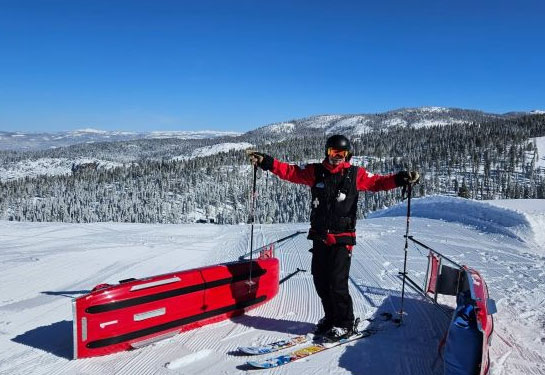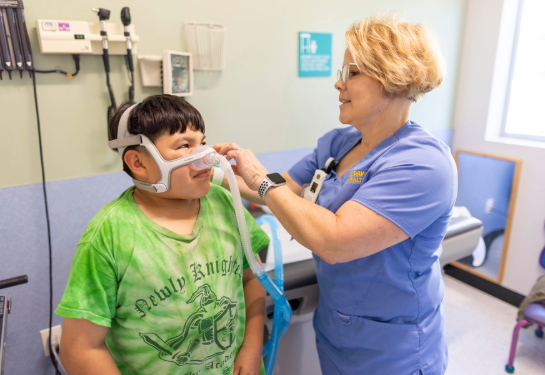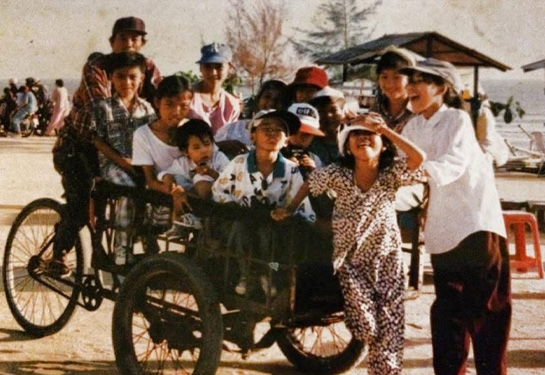Cancer patient back on the slopes thanks to surgeon who understands love of skiing
“When can I get back to skiing?”
That was one of the first questions 68-year-old William “Bill” Borelli asked UC Davis Health surgical oncologist Cameron Gaskill. For Gaskill, a skier himself, the question signaled something powerful: This patient was ready for a fight.
“Bill’s biopsy confirmed pancreatic cancer, which is one of the deadliest diagnoses we see,” Gaskill said. “But I could tell right away — his spirit, his drive — he was up for the challenge.”
A shared passion: Saving lives on the slopes
Borelli and Gaskill share more than a love for skiing — they're both ski patrollers, a tight-knit community of volunteers who brave treacherous terrain to rescue injured skiers.
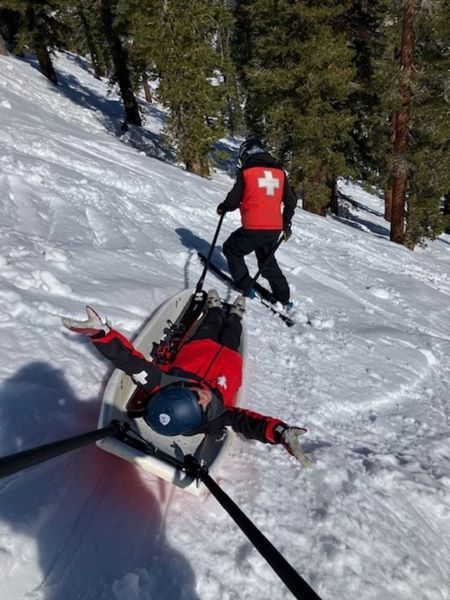
Gaskill volunteers as a physician ski patroller at Sugar Bowl Resort, just west of Lake Tahoe. He’s a resource for ski patrollers when people sustain critical injuries on the mountain.
Borelli serves at Dodge Ridge Mountain Resort in Pinecrest and directs the Mother Lode region for the Far West Division of the National Ski Patrol. He dedicates his winters to training others how to safely transport injured skiers down the mountain.
“Dr. Gaskill and I immediately connected over ski patrolling,” Borelli said. “It’s rare to find someone who understands both medicine and the mountain like he does. From the beginning, he looked me in the eye and was completely honest.
“Skiing isn’t just a sport — it’s a community,” Gaskill said. “It’s about camaraderie, challenge, and being out in nature with people you care about. Whether you're a surgeon or a skier, it’s about showing up for others when it matters most.”
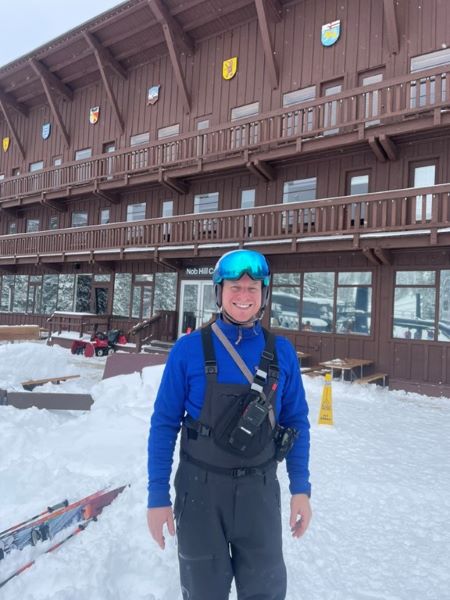
Beating the Odds
Pancreatic cancer is notoriously aggressive and often detected too late for surgery. Only about 20% of patients are eligible for surgical intervention. Borelli, remarkably, was one of them.
“It helped that Bill was in excellent shape and no stranger to tough terrain — physically or mentally,” Gaskill said. “He’s spent his life helping others in crisis. I saw this as our chance to return the favor.”
The cancer had been caught early, thanks to an observant student in Borelli’s classroom. A retired history teacher substituting in Sonora, he was approached by a student who asked, “Why are your eyes so yellow?”
That question sent Borelli to the doctor in January 2024 and likely saved his life. The answer was jaundice, caused by a bile duct obstruction that turned out to be a tumor.
The Whipple procedure
To remove the tumor, Gaskill recommended a Whipple procedure. During the complex operation, a surgeon removes the head of the pancreas, the first part of the small intestine, the gallbladder, and the bile duct. It’s an intensive, technically demanding surgery best performed at high-volume centers like UC Davis Medical Center.
“It’s one of the most complex surgeries but gives the highest chance for cure,” Gaskill explained.
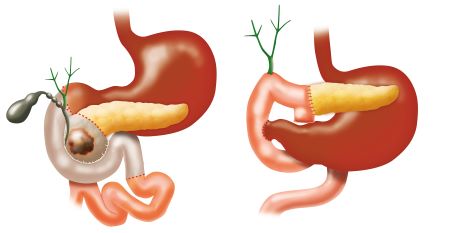
Before surgery, Borelli underwent “prehabilitation” — a regimen of daily exercise, high-calorie and high-protein meals, and strict hydration. “We’re getting the body ready to handle the stress of surgery. This conditioning makes a difference in how well patients recover after surgery,” Gaskill said.
Mind over matter
When the day of surgery arrived in March 2024, Borelli felt ready.
The tumor, measuring 2.4 centimeters, was successfully removed, along with a portion of his digestive system, which Gaskill then reconstructed. The road to recovery was long, but Borelli met each challenge with determination. He quickly recovered from surgery and went on to complete chemotherapy.
“Mentally, I was prepared for my extensive cancer treatment. I’ve been sober for 30 years, and I’ve learned not to live in fear,” he said. “The Serenity Prayer helped me through my cancer journey just as much as it did in sobriety. What recovery taught me, and cancer drove home, is the importance of living each day like it is your last but to plan for the future. I want to be the best I can be right now.”
The only time Borelli said he became emotional was right before surgery, when he kissed his wife, Sonja Borelli Kivley, goodbye. A ski patroller herself, along with her son, the family shares a passion for the mountain.
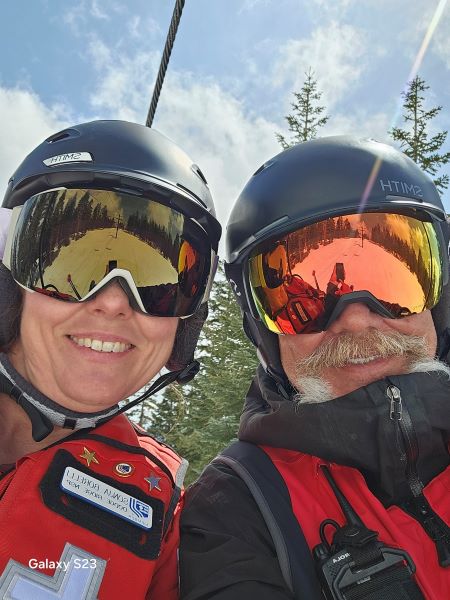
A triumphant return
Just five months after the Whipple procedure, the couple traveled to England and Ireland for a dream vacation. Ten months post-op, Borelli was back at Dodge Ridge, ski patrolling alongside his family. This, after enduring grueling biweekly chemotherapy for six months.
A scan in November 2024 showed no evidence of disease.
“Cases like Bill’s give us hope,” Gaskill said. “When he sent me a photo of himself skiing, it brought so much joy. To see someone thrive after such a major surgery — it’s why we do what we do.”
“Dr. Gaskill made it possible for me to get back to what I love,” Borelli said. “I’m back to ski patrolling, and I feel like I’ve got five or six more great years of skiing ahead of me.”
A regional leader in pancreatic cancer care
UC Davis Comprehensive Cancer Center performs more Whipple procedures than any other center in the region, averaging 20 to 30 per year.
The cancer center is also a founding member of the UC Pancreatic Cancer Consortium, a statewide research effort aimed at dramatically improving outcomes for one of the most lethal cancers. Gaskill serves on the consortium’s executive committee.
“As the number of pancreatic cancer cases continues to rise, we’re committed to turning the tide,” Gaskill said.
UC Davis Comprehensive Cancer Center
UC Davis Comprehensive Cancer Center is the only National Cancer Institute-designated center serving the Central Valley and inland Northern California, a region of more than 6 million people. Its specialists provide compassionate, comprehensive care for more than 100,000 adults and children every year and access to more than 200 active clinical trials at any given time. Its innovative research program engages more than 240 scientists at UC Davis who work collaboratively to advance discovery of new tools to diagnose and treat cancer. Patients have access to leading-edge care, including immunotherapy and other targeted treatments. Its Office of Community Outreach and Engagement addresses disparities in cancer outcomes across diverse populations, and the cancer center provides comprehensive education and workforce development programs for the next generation of clinicians and scientists. For more information, visit cancer.ucdavis.edu.

